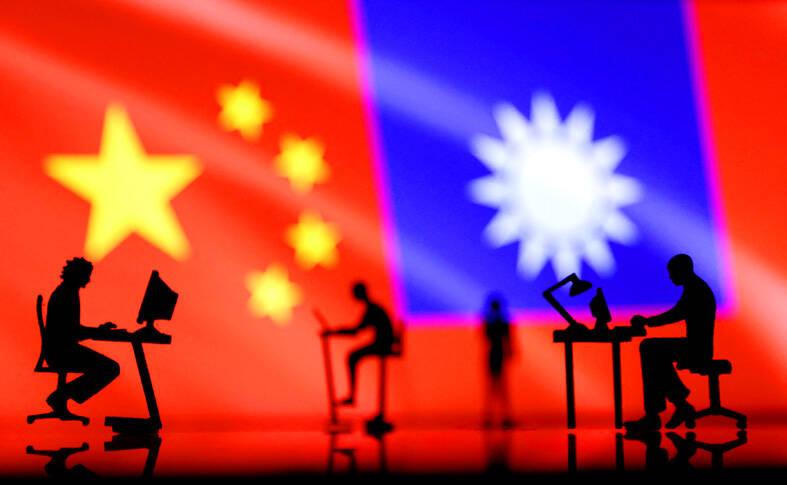Prosecutors allegedly found a specially developed encrypted app on a Democratic Progressive Party (DPP) staffer’s phone used to communicate with Chinese intelligence operatives, the Chinese-language Mirror Media reported today.
The staffer, assistant Huang Chu-jing (黃取榮), is one of four people along with Presidential Office consultant Wu Shang-yu (吳尚雨), former DPP worker Chiu Shih-yuan (邱世元) and formal ministerial assistant Ho Jen-chieh (何仁傑) suspected of spying for the Chinese Communist Party (CCP) during their time working for the government.
All four are currently detained without visitation rights.

Photo: Reuters
The Taipei District Prosecutors’ Office confirmed that the case is still under investigation and declined to comment on the report.
Huang allegedly used the app to inform the CCP of President William Lai’s (賴清德) hotel during an official visit to Paraguay when he served as vice president and his itinerary during the 2023 presidential election, as well as pass along the phone number and related contacts of Vice President Hsiao Bi-khim (蕭美琴), the magazine said.
Investigators also found records of conversations with foreign envoys and guests, including banquet locations, personnel present and other sensitive information, it said.
The app has never been released for the public and investigators have not been able to decrypt it, the report said, adding that investigators have only been able to identify what data Huang allegedly passed along by restoring his phone.
There could be more substantial leaks than what has already been found, it added.
Huang, a former assistant to New Taipei City Councilor Lee Yu-tien (李余典), was allegedly recruited by Chinese intelligence while conducting business in China years ago, prosecutors said.
Upon his return to Taiwan, he allegedly developed a spy ring on behalf of the CCP in exchange for money, recruiting his friend and party member Chiu, followed by Wu and then Ho, who was the assistant to Joseph Wu (吳釗燮) when he was minister of foreign affairs, prosecutors said.
Wu allegedly collected information from the Presidential Office and Ho from the Ministry of Foreign Affairs before passing it on to Chiu and Huang, who then sent it to China in return for thousands of dollars in rewards, prosecutors said.
In a separate case, Sheng Chu-ying (盛礎纓), assistant to former legislative speaker You Si-kun (游錫堃), was released on bail NT$200,000, restricted from leaving the country and placed under electronic monitoring.
Late last month, the DPP’s Central Evaluation Committee agreed to unanimously expel Huang, Chiu, Wu, Ho and Sheng from the party.

A year-long renovation of Taipei’s Bangka Park (艋舺公園) began yesterday, as city workers fenced off the site and cleared out belongings left by homeless residents who had been living there. Despite protests from displaced residents, a city official defended the government’s relocation efforts, saying transitional housing has been offered. The renovation of the park in Taipei’s Wanhua District (萬華), near Longshan Temple (龍山寺), began at 9am yesterday, as about 20 homeless people packed their belongings and left after being asked to move by city personnel. Among them was a 90-year-old woman surnamed Wang (王), who last week said that she had no plans

TO BE APPEALED: The environment ministry said coal reduction goals had to be reached within two months, which was against the principle of legitimate expectation The Taipei High Administrative Court on Thursday ruled in favor of the Taichung Environmental Protection Bureau in its administrative litigation against the Ministry of Environment for the rescission of a NT$18 million fine (US$609,570) imposed by the bureau on the Taichung Power Plant in 2019 for alleged excess coal power generation. The bureau in November 2019 revised what it said was a “slip of the pen” in the text of the operating permit granted to the plant — which is run by Taiwan Power Co (Taipower) — in October 2017. The permit originally read: “reduce coal use by 40 percent from Jan.

China might accelerate its strategic actions toward Taiwan, the South China Sea and across the first island chain, after the US officially entered a military conflict with Iran, as Beijing would perceive Washington as incapable of fighting a two-front war, a military expert said yesterday. The US’ ongoing conflict with Iran is not merely an act of retaliation or a “delaying tactic,” but a strategic military campaign aimed at dismantling Tehran’s nuclear capabilities and reshaping the regional order in the Middle East, said National Defense University distinguished adjunct lecturer Holmes Liao (廖宏祥), former McDonnell Douglas Aerospace representative in Taiwan. If

‘SPEY’ REACTION: Beijing said its Eastern Theater Command ‘organized troops to monitor and guard the entire process’ of a Taiwan Strait transit China sent 74 warplanes toward Taiwan between late Thursday and early yesterday, 61 of which crossed the median line in the Taiwan Strait. It was not clear why so many planes were scrambled, said the Ministry of National Defense, which tabulated the flights. The aircraft were sent in two separate tranches, the ministry said. The Ministry of Foreign Affairs on Thursday “confirmed and welcomed” a transit by the British Royal Navy’s HMS Spey, a River-class offshore patrol vessel, through the Taiwan Strait a day earlier. The ship’s transit “once again [reaffirmed the Strait’s] status as international waters,” the foreign ministry said. “Such transits by